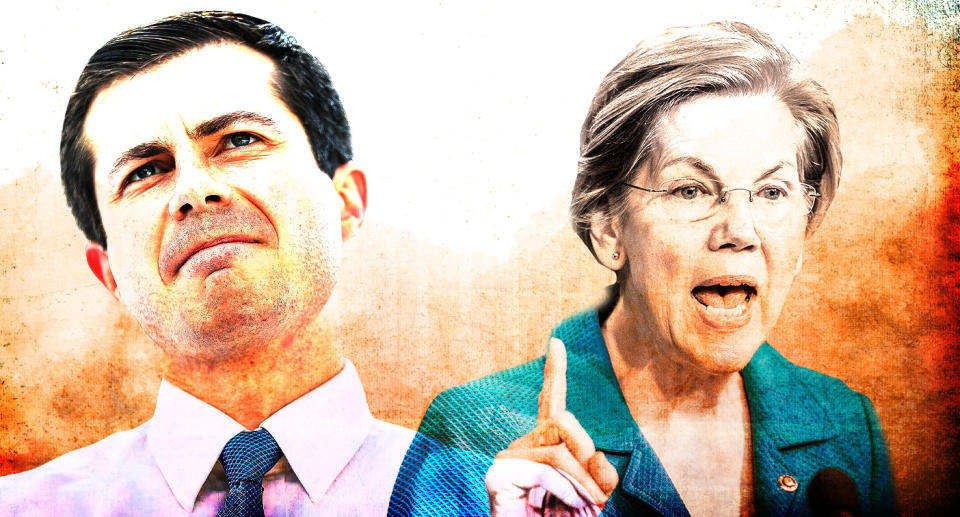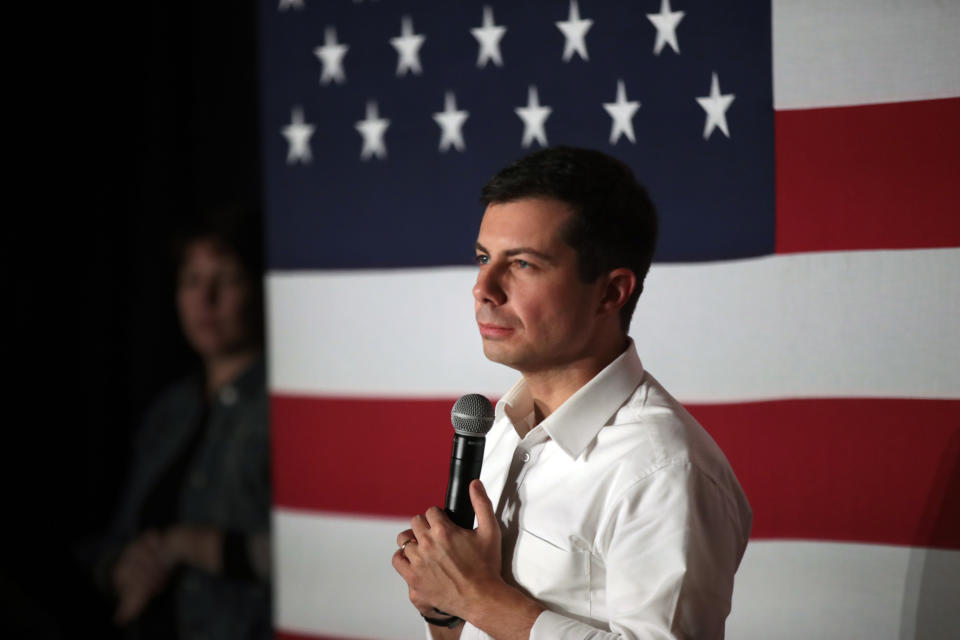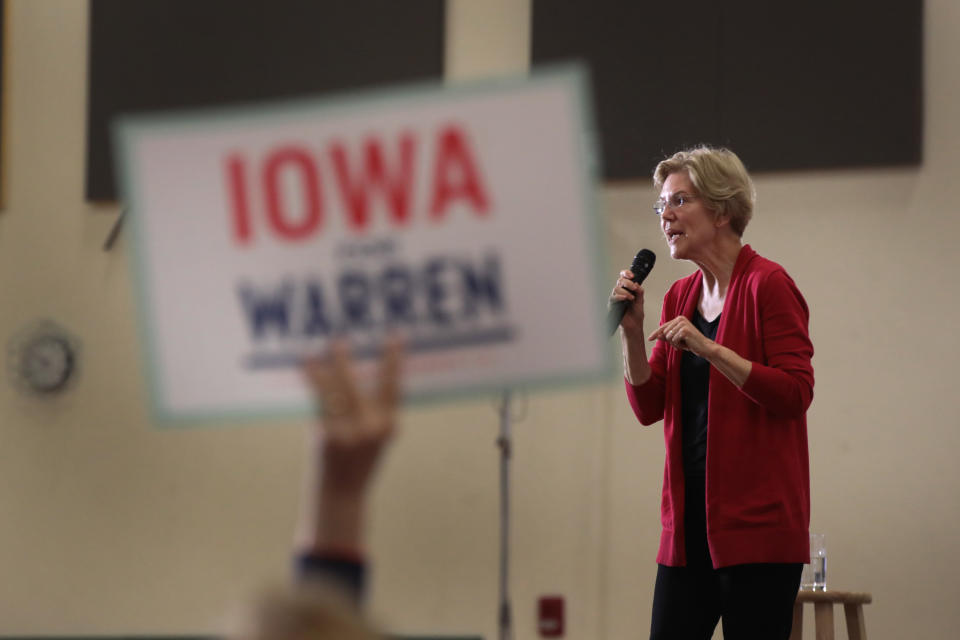Buttigieg predicts a 'two-way' race against Warren as both compete to sound more like Obama
Welcome to 2020 Vision, the Yahoo News column covering the presidential race with one key takeaway every weekday and a wrap-up each weekend. Reminder: There are 91 days until the Iowa caucuses and 365 days until the 2020 election.
Over the weekend, Pete Buttigieg made waves with a suggestion — which he later partially retracted — that the 2020 Democratic primary contest is “getting to be a two-way” race between him and Elizabeth Warren.
“It’s early to say,” he told Showtime’s “The Circus.” But “a world where we’re getting somewhere is a world where it’s coming down to the two of us.”
Opponents said Buttigieg’s remarks were presumptuous, with Kamala Harris calling the 37-year-old South Bend, Ind., mayor “naive” and encouraging him to “review past elections” to see that “what's happening right now is not necessarily determinative of the outcome.” Barack Obama adviser David Axelrod described Buttigieg’s prediction as “a campaign strategist’s nightmare.” The Guardian mocked him: “Pete Buttigieg: race is between me and Warren – as new poll puts him fourth.” And Buttigieg eventually walked his comment back.
“I don’t remember the exact context,” he told reporters Saturday. “The bottom line is this is a really strong competition among really strong campaigns.”
But if Buttigieg was right, the race could come down to which of the two better embodies the political legacy of Barack Obama.

This weekend provided the clearest preview yet of what that kind of contest would look like.
When the Guardian noted that Buttigieg is fourth in the polls, it wasn’t wrong. The RealClearPolitics national polling average currently puts him at 7.1 percent — 10 percentage points behind the third-place candidate, Bernie Sanders, and a full 22 points behind frontrunner Joe Biden.
But the reason Buttigieg is so optimistic is Iowa. In mid-September, he was polling at 7.5 percent in the Hawkeye State — good for fifth place, behind Harris. Now he’s averaging 17 percent, which puts him in second, ahead of Biden and Sanders and about 5 points behind Warren. The campaign’s theory is that if Buttigieg and Warren finish in the top two in the first-in-the-nation caucuses on Feb. 3, it will be hard for Biden (the other leading “moderate” besides Buttigieg) and Sanders (Warren’s fellow “liberal”) to displace them in subsequent primaries — effectively making it a two-person race.
We’ll see. If Buttigieg’s prophecy does come to pass, however, campaign watchers will likely look back on last weekend as the moment their matchup began in earnest.
On Friday, 14 candidates assembled at the Wells Fargo Arena in Des Moines for the state Democratic Party’s annual Liberty and Justice Celebration (formerly known as the Jefferson-Jackson Dinner). It was at this event in 2007 that Obama launched his Iowa ascent, delivering the retooled stump speech and showing off the organizing prowess that eventually propelled him to victory in the caucuses.

What was striking about Friday (and the sparring that followed) is that both Buttigieg and Warren tried to repeat Obama’s success, but by focusing on different parts of his winning message.
Buttigieg went for unity. Noting in his Liberty and Justice speech that “the first time I came to this state was as a volunteer to knock on doors for a presidential candidate” — “a young man with a funny name” — the young man from Indiana with a funny name went on to say that he was “running to be the president who will stand amid the rubble, pick up the pieces of our divided nation and lead us to real action.”
“I am ready to gather up an American majority that is hungry for change, that is done with division,” Buttigieg said. “I will not tire from the effort to include everyone in this future we are trying to build — progressives, moderates and Republicans of conscience who are ready for a change. The time has come.”
Buttigieg, in other words, sounded a lot like the Obama of there’s no red America and no blue America. And even the attack Buttigieg leveled on Warren sounded a lot like the attack Obama leveled on Hillary Clinton, his 2008 rival.
“We will fight when we must fight, but I will never allow us to get so wrapped up in the fighting that we start to think fighting is the point,” Buttigieg said, not so subtly alluding to Warren’s favorite verb. “In order to win and in order to lead, it’s going to take a lot more than the political warfare we have come to accept from Washington, D.C. We already have a divider in chief.”
Or as Obama put it in his Jefferson-Jackson speech, “I don’t want to spend the next year or the next four years refighting the same fights that we had in the 1990s.”
Warren, for her part, was just as Obamaesque in her Liberty and Justice remarks. She simply revived a different aspect of his message — the one about vision.

“The same old Washington textbook campaigns just won’t do in this election,” Obama said in his Jefferson-Jackson speech. “Triangulating and poll-driven positions because we’re worried about what Mitt or Rudy might say about us just won’t do. If we are really serious about winning this election, Democrats, we can’t live in fear of losing it.”
Or as Warren put it Friday, “I’m not running some consultant-driven campaign with some vague ideas that are designed not to offend anyone.”
“Anyone who comes on this stage and tells you to dream small and give up early is not going to lead our party to victory,” she added. “Fear and complacency does not win elections; hope and courage wins elections.”
And so there you have it: the unity thing vs. the vision thing. Hope vs. audacity. If Buttigieg gets his way (and that’s a big if), the 2020 Democratic contest may come down to a choice between two versions of the last Democratic president’s legacy. In that scenario, primary voters will have to answer a difficult question. Obama won in 2008 by pledging to bring people together. But every change he made — on health care, on climate, on immigration — seemed to drive Americans further apart. Which path — preaching togetherness or preparing for battle — leads to victory in 2020?
_____
Download the Yahoo News app to customize your experience.
Read more from Yahoo News:





